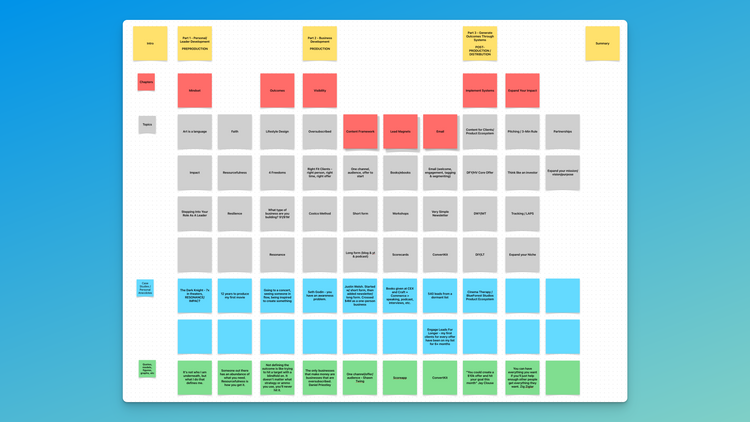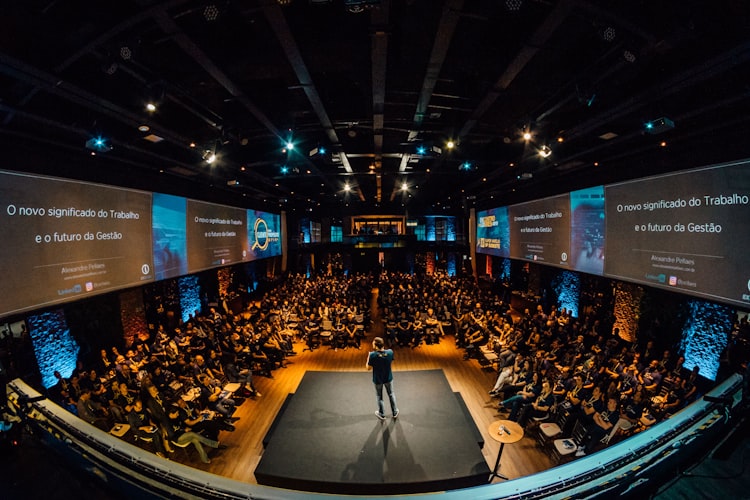How To Apply The Craftsman Mindset

For the next 10 weeks I'll be sharing posts that relate to what we discussed that week in the new 10k Creator Podcast that Joe Pulizzi and I started.
The first episode came out last Wednesday, and you can listen to/watch it and all future episodes here.
The Craftsman Mindset
This week in the inaugural episode we discussed the mindsets that help creators do creative work at a professional level.
We started with mindset because it accounts for a greater part of the success in your career than anything else - more than skills, tactics, strategies, or talent.
Most creators, instead, focus on getting better at their craft, doing more work or creating more projects, and end up burning themselves out or getting so discouraged that they give up.
I keep a poster on my wall with pictures of about 30 musicians I worked with over the years here at the local music venue, Velour Live Music Gallery, because nearly half no longer perform or make any money from their music.
I started Craftsman Creative to help prevent that from happening in the future, and the Craftsman Mindset is the foundation of everything else I teach.
Success is 80% mindset, only 20% strategy and skills. ~Tony Robbins
Today I'll share how you can learn and implement the Craftsman mindset in your own creative work.
An Outcome-Focused Approach
The term Craftsman mindset comes from Cal Newport's book, So Good They Can't Ignore You.
In it, he talks about the craftsman mindset in this way:
"I'll call this output-centric approach to work the craftsman mindset."
"The craftsman mindset...focuses on what you can offer the world... It asks you to leave behind self-centered concerns about whether your job is "just right," and instead put your head down and plug away at getting really damn good. No one owes you a great career, it argues; you need to earn it--and the process won't be easy."
I've tweaked it to be less about output and more about outcome, meaning "what do you want to accomplish at the end of all of this effort?"
That question helps to focus your efforts and achieve that outcome in a more direct way.
Rather than get as good as I can at my craft and then hope that someone hires me, it's I want to headline a show at the local venue in 6 months. Here are the steps I need to take to get there...
And what if you don't know the steps? Call the destination and ask for directions. (From Derek Sivers' book Your Music and People)
Start with the outcome, reverse engineer the steps to get there, take action and adjust course along the way.
The Opposite Approach
The opposite, for contrast, is to "follow your passion". To do the thing you love, get good at it, and then...wait.
I have dozens of examples of friends and other creatives who have taken this approach and then waited years, and in some cases more than a decade for something to magically happen, and it never did.
Film directors that waited to get hired. Musicians who waited for the perfect collection of songs before releasing an album. Photographers who saved up to buy the best new camera before starting their project. Writers who have had a book they've written and never published because no agent will sign them.
The "follow your passion" approach leads to frustration, pain, disappointment, rejection, and heartache.
If you're in this mode or mindset right now - "I'm just waiting for X to happen!" - then I urge you to use this moment to try the Craftsman mindset out and see what happens.
How to apply the Craftsman mindset
There's a simple process you can do right now, in the next few minutes, that can change everything for you if you'll try it and give it a real shot.
- Determine the outcome
- Reverse engineer the steps to get there
- List out everyone who can help you
- Schedule an hour a day to make progress
Determine The Outcome
Grab a sheet of paper, open a new note or your notebook, and write this at the top:
Looking forward a year from now, what would I need to accomplish to feel good about my progress.
I love this prompt because it gives you a time and an outcome.
You can change the time to 3 years, 90 days, whatever works for you. If you choose a longer timeline, know that you might end up including multiple outcomes or projects, where if you choose 90 days for your time, you'll likely just choose one project.
Now, write.
Put on a timer for 30 minutes, and don't move from your chair until the time is up. Free write, meaning write whatever comes to mind when you read that prompt and try to answer it.
At the end you'll have some ideas, and maybe a project or two with a specific outcome in mind. "Publish my book", "Start a blog", "Release an EP"
Whatever outcome you've written down, circle it, underline it, highlight it. That's your north star for the next few months until you achieve it.
Reverse-engineer the steps
Now that you have an outcome, what has to happen in order to achieve it?
Write down anything you can think of. It doesn't have to be in order - you'll do that later - and it doesn't have to be complete. You'll always be able to add and adjust later.
If your goal was to write and publish a book, your list might look something like this:
- design the cover
- get a sku
- find a printer (I recommend Lulu, btw)
- write the chapters
- find and hire an editor (Reedsy is a great resource)
- create the outline
- write the table of contents
- get feedback from early readers
- create a website
- create the listing on Amazon
- find and hire an interior layout designer (plenty on Upwork)
- etc.
That list is by no means exhaustive, but you get the idea of what steps are ahead of you.
Just like going hiking, you want to know the distance, the terrain, and the preparations you'll need to make.
You don't want to bring a half-drunken bottle of water and a bag of chips for a three-day backpacking trip in the snow where it drops below freezing at night.
No, you'd prepare a lot more for something like that.
Same with projects. Is this a big project? Or a small one? Plan accordingly.
List out everyone that can help you
This one is important and regularly overlooked. We sometimes feel that bringing on someone to help somehow cheapens the final result.
Poppycock.
Some of my most successful projects for me personally have been made with anywere from one to over a hundred collaborators.
You can't make a feature film alone. It's way more fun - and possible - with dozens of crew and cast and sometimes hundreds of background extras.
Your project can benefit from sponsors, affiliates, financiers or "backers", advertisors, cheerleaders, editors, engineers, and more.
List out everyone that could potentially help you get this outcome and then commit to reaching out to them to find the perfect team for this project.
Make Progress Every Day
My friend Kevin gave me this advice years ago, and I've lived it ever since. I'd tattoo it on my arm if I wanted to ever have a tattoo.
Open your calendar, and look at your schedule. What time every day can you commit to working on this project for the next 1-3 months?
Is it early morning, where you'll get up earlier to carve out time to work on this project? During your lunch break? After work, or late at night?
What are you willing to give up to create this time in your schedule?
Now, create a recurring event that repeats every day, call it your Creative Time or Deep Work time, (I use Craftsman Time), and commit to showing up every day to make progress.
Use your list of milestones and your list of people to contact to create a plan of what you're working on at the beginning of each week. Make progress every day, and watch yourself get closer and closer to your outcome with each passing day.
That's it. It seriously is that simple, and that possible.
You just have to have a plan then act accordingly.
PS - Craftsman Creative is a "choose your own adventure" type deal, so there are a few paths you can take from here:
- Check out the different topics on the blog and head down a rabbit hole of what you need most in your business right now.
- Learn how to build a six-figure creative business with my book, Craftsman Creative
- Join the Society of Independent Creators, a new online community for supporting, teaching, and even investing in each other's creative projects.
LINKS FOR THIS WEEK
Mark your calendars! On Friday Morning (9am Pacific, 12pm Eastern) I'll be doing the first in a monthly series of workshops where I teach you something that will help you grow your business.
This week - creating a lead magnet that attracts more of your ideal audience and customers.
Workshops will last for 20-30 minutes, are free if you attend live, and then the recordings will live in the community. (Have you joined yet?societyofindependentcreators.com)
Sign up for free here: https://lu.ma/l1wh84he
---
As mentioned earlier, the new podcast that I created along with Joe Pulizzi and TheTilt.com is out now. It's called The 10k Creator, and you can watch/listen to the first episode here:
https://blog.craftsmancreative.co/10k-creator-show/
---
Check out the SparkLook Partner Program if you have a newsletter that you'd like to grow MUCH quicker.
Since joining I've seen 2-3 new subscribers come in per day, and I can tell that these are people who came from a recommendation by another newsletter writer. It's a great program put on by a great team.
Join here for free: https://sparklp.co/p/08a5431b97






Member discussion